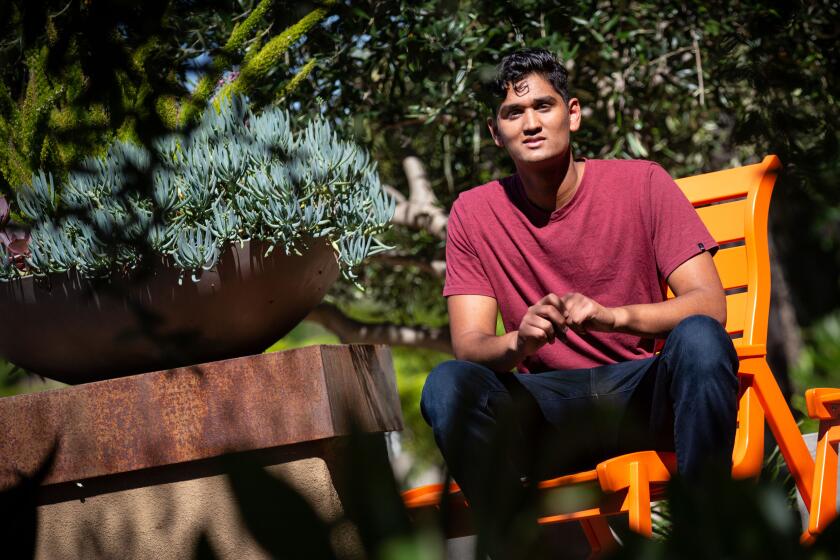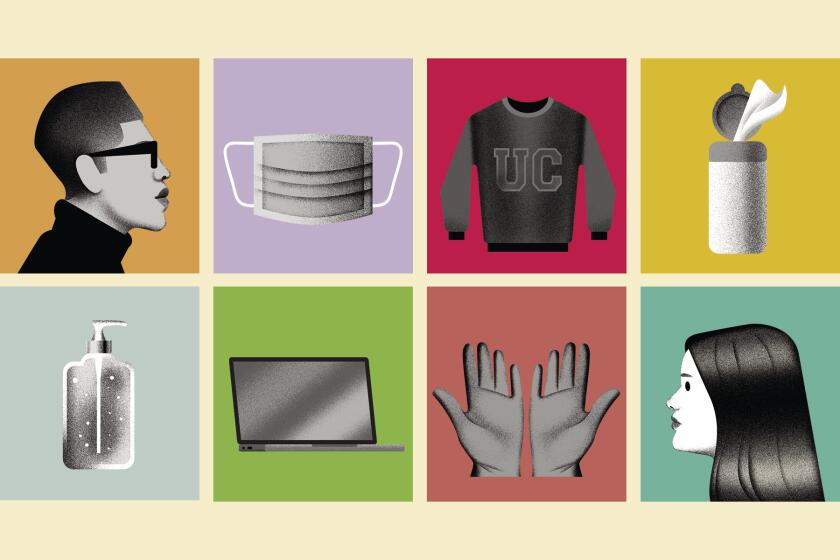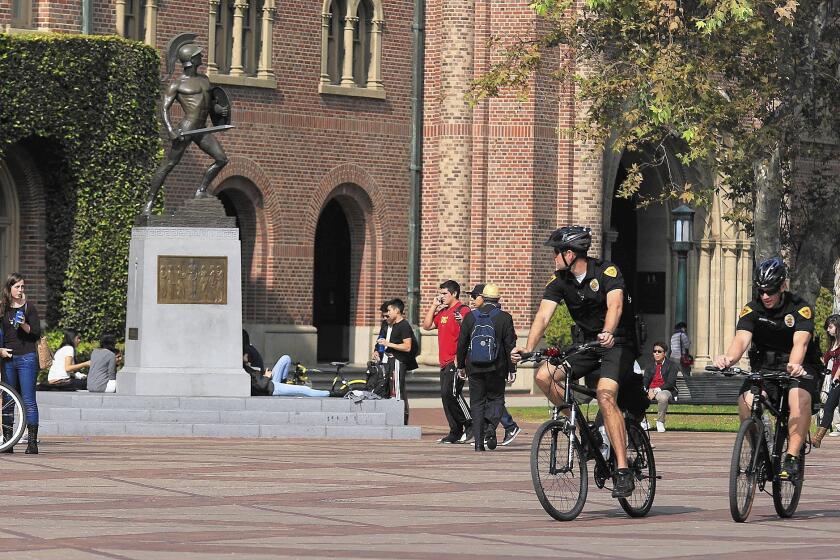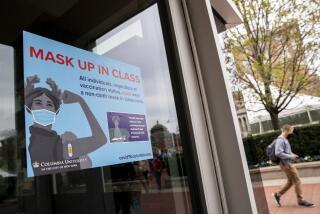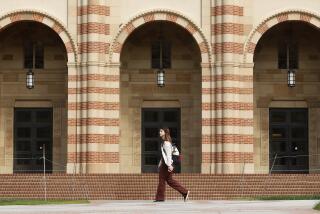Students return to campus as coronavirus infections grow in some states
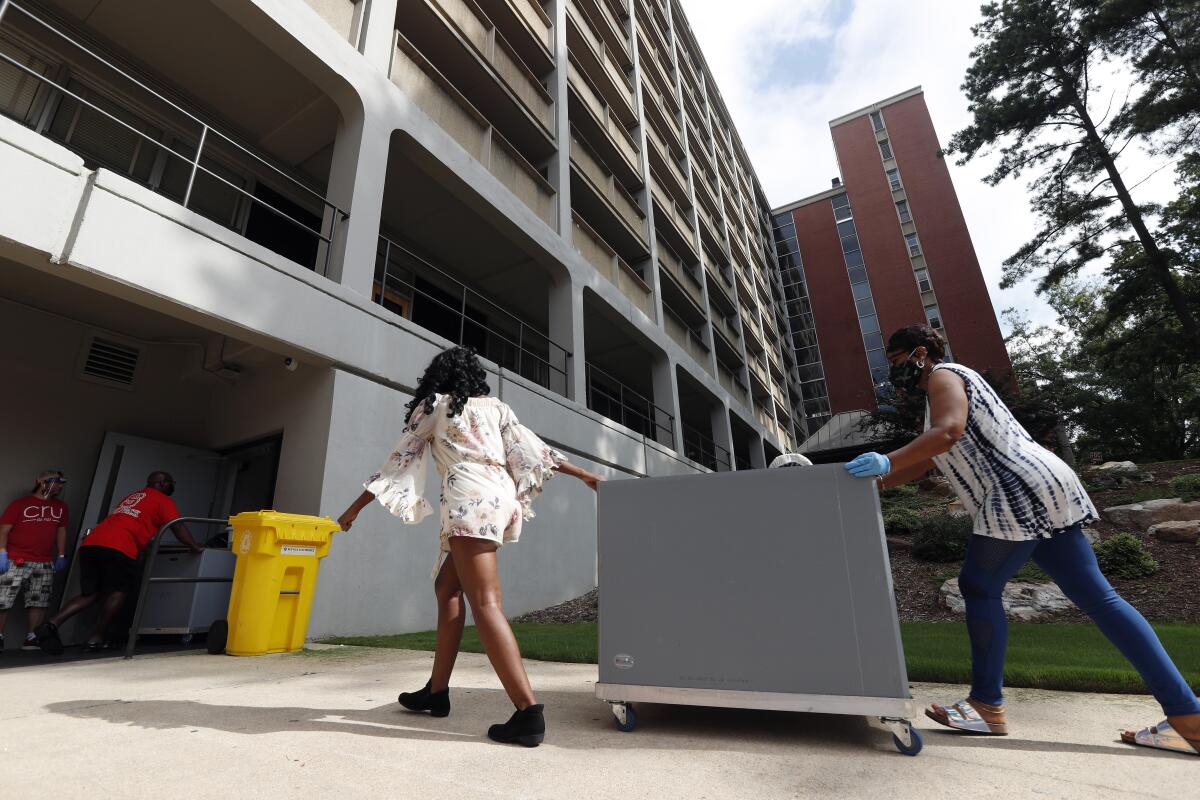
- Share via
RALEIGH, N.C. — The first wave of college students returning to their dorms aren’t finding the typical mobs of students and parents. What they found Friday were strict safety protocols and some heightened anxiety amid a pandemic in which virus infections are rising in dozens of states.
North Carolina State University staggered the return of its students over 10 days and welcomed the first 900 students to campus, where they were greeted Friday by physically distanced volunteers donning masks and face shields.
The rite of passage was a well-organized but low-key affair, as boxes were unloaded, luggage was wheeled and beds were hauled.
“It’s just odd not seeing anybody. You expect it to be hustle and bustle and all that around, but there was nothing. It was pretty empty,” said Dominick DePaola, an incoming freshman from Charlotte, N.C.
Across the country, students are jumping through additional hoops by getting tests, navigating travel quarantines and abiding by strict rules.
Elon University in North Carolina mailed testing kits to all 7,000 students ahead of their arrival in a few weeks. Maine’s Colby College will require students to be tested every other day for two weeks at a cost of $5 million.
Everyone has an opinion about the value of taking a gap year after high school or during college. For those who do so, it can be a chance for an adventure as well as an opportunity to grow and mature.
The University of Rhode Island is scaling back campus housing to abide by distancing requirements, causing a scramble for some students.
At N.C. State, the university usually houses 10,000 students but will have 6,700 on its Raleigh campus this fall, said Chancellor Randy Woodson. And those students were arriving over an extended period instead of all at once over a single weekend as they normally would.
“Just like the rest of the world, we have to figure out how to carry on,” said Betsy Flanagan, who was sending her freshman son, Arch, off to college. “This virus isn’t going away and it’s going to be with us for quite a while, so we all have to figure out how to safely exist, and that includes continuing to educate our future.”
Many parents feel uneasy about students returning to campus this fall. Here are some things to consider before they do.
In West Virginia, one university put out the welcome mat Friday for students and their families, only to temporarily pull it away.
Over an eight-day stretch, students at West Virginia State University, a small historically black college, were given staggered, two-hour time slots to unload belongings into their residence halls, then were sent home until the start of the fall semester Aug. 10.
“I don’t have anything to worry about,” said Jihad Shockley, a sophomore resident assistant from Columbus, Ohio, and a member of the Yellow Jackets’ men’s basketball team. “It’s like, if you get it, quarantine for two weeks [and] hope for the best. I guess I’m not really too scared about it.”
On the same day California broke a new daily record for COVID-19 deaths, a teenager in the Central Valley has died of causes related to the disease, becoming the first such juvenile death in California.
Nationwide, the second surge of confirmed virus cases appears to be leveling off. But scientists warn that trend is driven by four populous, hard-hit states — Arizona, California, Florida and Texas — and that cases are rising in more than two dozen other states.
Students appeared to be ready to accept the risk and move on.
Freshman Nicholas Cecil of Hilliard, Ohio, missed his senior season of baseball and his high school prom, called off because of the pandemic. He’s ready to put that behind him at West Virginia State, where he’s on the baseball team.
“Honestly, it’s a new chapter in my life,” Cecil said. “It’s meeting new people, getting out and playing baseball at a high level. It’s kind of the first step to being an adult. You’re living more so on your own.”
Around 40 individuals on USC’s fraternity-filled 28th Street have contracted the virus. Both UCLA and USC have reported over 150 positive cases.
In North Carolina, students were happy to be on campus, even if it was a bit subdued compared with the normal, frenetic move-in process.
“Because of corona, I didn’t really have too many expectations,” said Ann Grace Jacocks, an incoming freshman from Fayetteville, N.C.
“A lot of classes are going to be online so that’s not fun, but other than that, I’m ready to go,” said Arch Flanagan, an incoming freshman.
More to Read
Sign up for Essential California
The most important California stories and recommendations in your inbox every morning.
You may occasionally receive promotional content from the Los Angeles Times.
